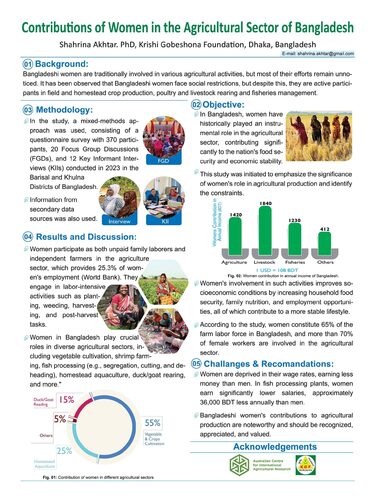Contributions of women in the agriculture sector of Bangladesh
Abstract
Women in Bangladesh face a range of challenges in society. The study investigated the multifaceted contributions of women in various aspects of agriculture, including production, processing, marketing, and decision-making. The research employed a mixed-methods approach, combining qualitative interviews, focus-group discussions, and quantitative surveys to collect data from 300 women farmers, agricultural workers, and key stakeholders in the coastal area of Bangladesh. The study also drew on secondary data sources, such as government reports, academic publications, and development agency reports, to provide a comprehensive analysis. The findings reveal that women in Bangladesh are heavily involved in agricultural activities, both as unpaid family laborers and independent farmers. They contribute significantly to food production, accounting for a substantial agricultural workforce. Women’s participation is particularly in labor-intensive tasks, such as planting, weeding, harvesting, and postharvest activities. They play a crucial role in transforming raw agricultural produce into marketable products through sorting, grading, cleaning, packaging, and preservation. Women’s contributions extend beyond on-farm activities and encompass the entire agricultural value chain, including the marketing and distributing of agricultural products. Women often form self-help groups and cooperatives to enhance their bargaining power, access markets, and share knowledge and resources. Moreover, the study uncovers the growing influence of women in decision-making processes related to agriculture. Recognizing and supporting women’s contributions can contribute to inclusive and sustainable agricultural development, poverty reduction and improved food security in Bangladesh.

